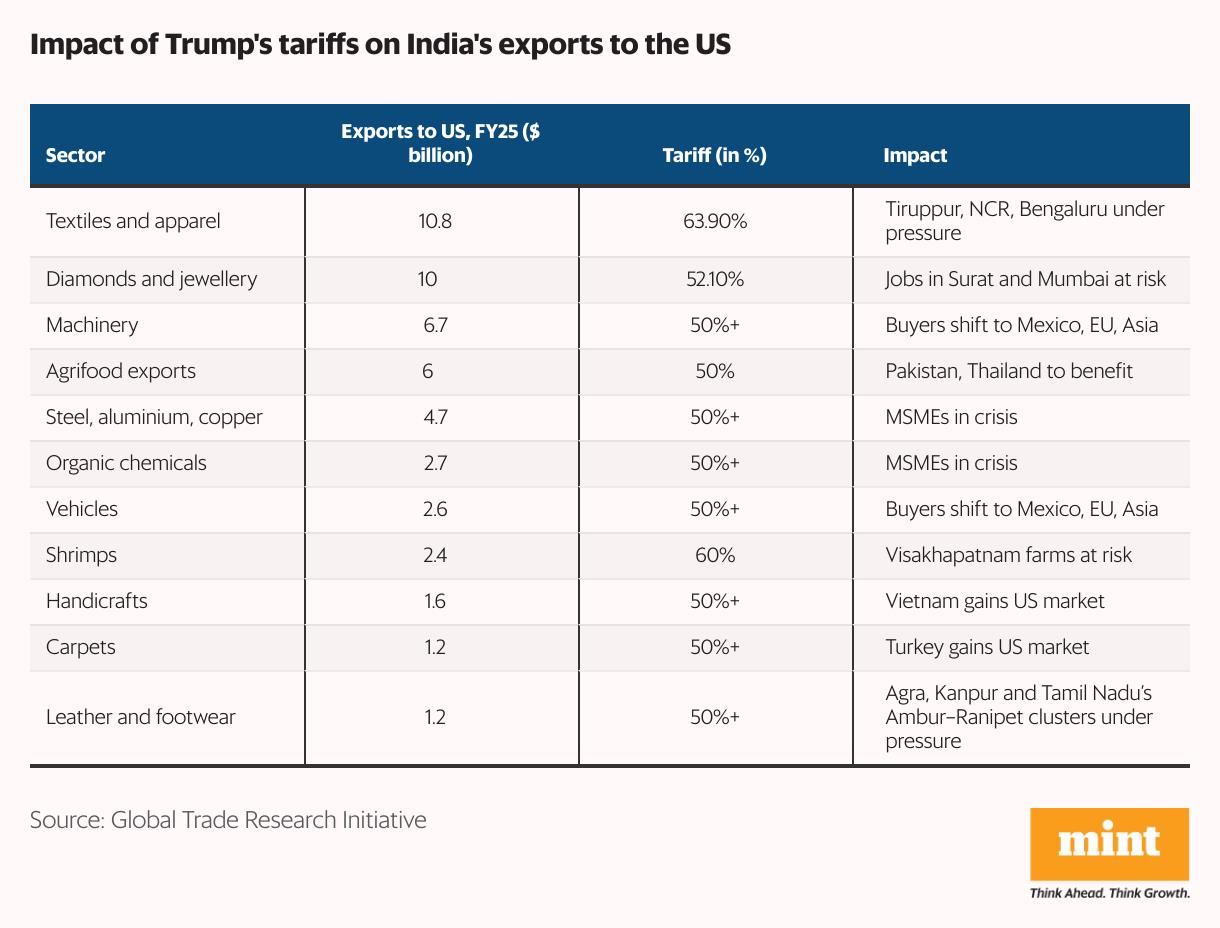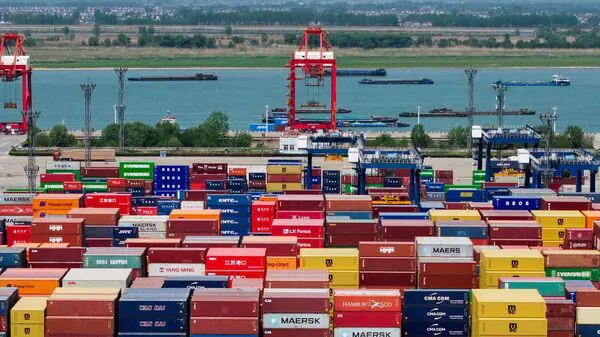
India Plans To Double Down On Swadeshi Movement
The Centre is doubling down on locally made products to counter a likely drop in overseas shipments, as hefty US tariffs kick in and President Donald Trump vows to punish countries targeting US technology firms.
India aims to wait out the deadlock with the local push, four people aware of the plan said, after US trade talks stalled and its president Donald Trump put India in crosshairs. Earlier in the day, the US notified an extra tariff of 25% on Indian goods, citing New Delhi's refusal to stop buying Russian oil, and raising total levies to a steep 50%.
India's position on not granting wider market access for American agricultural and dairy products remains unchanged, and a solution may be several months or even years away, the first of the four people said. In the meantime, the government plans to unleash a campaign to promote local goods, and may extend duty drawback incentives for several goods. Duty drawback rates are refunds for import duties for materials used to make goods which are exported later.

Prime Minister Narendra Modi fired the first salvo on Tuesday, urging citizens to buy local products and requesting retail outlets to display 'Swadeshi Only' signboards. The officials said the plan is to drive the narrative further, with trade talks effectively at a standstill.
New campaign“Swadeshi is not new; it has been there for a long time. The government is now planning to encourage consumers to buy only India-made products, while traders would also be advised to procure domestically manufactured goods instead of relying on imported items," the second person said.“A campaign will be launched to promote swadeshi goods, with states being asked to encourage people to buy India-made products. The Centre may also consider incentives for states faring better in trading made in India goods, this person said.
Also Read | Can pact with world's largest trading bloc help India beat tariff heatEarlier in the day, Trump lashed out against taxes and regulations that he said hurt US technology companies, threatening additional levies on such nations. Trump posted on Truth Social that he would“stand up to countries that attack our incredible American Tech Companies."
“Digital Taxes, Digital Services Legislation, and Digital Markets Regulations are all designed to harm, or discriminate against, American Technology," he wrote. While New Delhi did not respond to Trump's comments, the European Union asserted its sovereign rights to regulate economic activities in its territory.
“Adopting swadeshi is a well-thought-out move," said Prof. Rakesh Mohan Joshi, vice-chancellor of the Indian Institute of Foreign Trade (IIFT). "India has a huge domestic market and consumption base that will drive the manufacturing sector. At a time when countries like the US are pushing their home-made products, India has the potential to take the lead and reduce its dependency on foreign goods," Joshi said. The government's strategy to find new export markets will help reduce losses, he added.
Strategic shockAjay Srivastava, who co-founded trade thinktank Global Trade Research Initiative (GTRI), termed the Trump tariffs a "strategic shock" which could cause mass unemployment in export hubs, and weaken India's participation in global value chains.
“The damage is going to be substantial if the tariff remains in place for long. Once competitors gain ground in the US market, it will be very difficult for Indian exporters to reclaim lost space," said Srivastava, urging New Delhi to step up engagement with the US. Competitors like China, Vietnam, Mexico, Turkey, and even Pakistan, Nepal, Guatemala, and Kenya may gain from the US action, potentially locking India out of key markets even after tariffs are rolled back.
Also Read | Retail investors' verdict: Tariffs can't trump a good beGTRI expects the new tariffs to slash India's exports to the US by 43% to $49.6 billion in FY26, down from the previous year's $86.5 billion. Still, India's overall exports may rise to $839.9 billion thanks to a 10% growth in services exports to $421.9 billion, it said in a report. Economic growth may slow from 6.5% to 5.6%.
The US is India's largest trading partner, with Indian goods exports to the US rising 11.6% in FY25, from $77.52 billion in FY24 to $86.51 billion. To be sure, imports from the US also rose but by a smaller margin of 7.42%, going up from $42.20 billion to $45.33 billion during the fiscal year that ended on 31 March.
Deal hopes“The government is very much engaged with the US through talks for a Bilateral Trade Agreement, and a deal is expected to be signed along the lines of the joint statement announced by the leadership of both nations on 13 February. From the very beginning, the Indian side has made it clear that the agreement must be mutually beneficial and not one-sided, and the government will continue to maintain that stand in the further rounds of talks when they resume," said the third person.
The new tariff regime is expected to cause a "two-fold economic shock," Dun & Bradstreet said in a report, affecting India's energy import costs and export competitiveness. It said a 50% diversion of Russian oil imports would result in an additional annual cost of around $2.1 billion, raising import costs and potentially lifting domestic retail inflation. On the export side, the tariff threatens thousands of Indian suppliers, with a significant concentration of risk among the 4,300 suppliers who have only a single US customer, it said.
Also Read | India, EU accelerate FTA talks, eye tariff cuts on textiles and alcohoIndian negotiators have put forward what they consider the best possible deal to the US team, the fourth person said. "If Washington accepts, the agreement could be signed soon; otherwise, the process may take longer. At the same time, the government is recalibrating its efforts to strengthen the domestic manufacturing base," the person added.
Swadeshi today means building resilience through viable local production and strengthening small and cottage industries, a trade expert said.
Policy push"To reduce the impact of tariffs, policies should encourage 'Make in India' and the wider use of domestically manufactured products. Industry is also looking forward to policy and tax incentives such as stimulative packages or enhanced export benefits for sectors like textiles, marine products, and MSMEs to further boost exports of Indian-made goods," said Vimal pruthi, partner, international trade, EY India.
The Union ministry of micro, small and medium enterprises will consult the industry on enhancing export competitiveness, additional secretary and development commissioner Rajneesh said at an industry event. He noted that MSMEs, which contribute about 45% to India's exports, must be competitive in both price and quality as they face the US President Donald Trump's 50% tariff on Indian products from 27 August. On Monday, the Centre increased the duty drawback rate on jewellery, in an effort to soothe exporters.
According to the India SME Forum, the swadeshi programme is economically viable. "With the size of India's domestic market and the growing capabilities of small and medium enterprises, we have the strength to substitute many imported goods with locally made products. What is needed is consistent policy support and awareness among consumers, because once demand shifts towards Indian products, MSMEs will scale up quickly and deliver both quality and competitive prices," said Vinod Kumar, the forum's president.
Crisil Ratings said the tariffs may slash the readymade garment industry's revenue growth by half this fiscal year. This, coupled with a decline in profitability, will impact the credit metrics of industry players. The impact will vary by company, with some deriving more than 40% of their revenue from the US, it said in a report.
New marketsTextile companies are trying to compensate for the US loss.“The industry is doing all it can to mitigate the impact of the high US tariff, but developing new markets and clients takes time and cannot be achieved overnight," said Rakesh Mehra, chairman of the Confederation of Indian Textile Industry.“The importance of the US for our textile and apparel exporters can never be undermined," Mehra added.
Meanwhile, Xiabing Feng, principal commercial officer at the US Embassy in India, said the US is committed to working with India by exporting high-quality products and services to support its energy security and economic growth. Speaking at an event in New Delhi, Feng noted that collaboration between the two countries can drive transformative change in the global energy sector.
Also Read | Spooked by Trump tariffs, MSMEs seek swift rollout of export intelligence portaWhen India's government promotes local manufacturing, it creates many jobs, from large industries to small toy factories, said Vivek Singhal, co-founder of Bidso, a B2B toy company.“Making sure our products are cutting edge, reasonably priced, and competitive on a worldwide scale is what counts now. If we support that ecosystem, India will be able to meet its own needs while simultaneously becoming a major exporter and generating long-term, stable employment," said Singhal.
PM Modi urged Indians to turn to indigenous products as a shield against mounting US trade tariffs, invoking Lord Krishna as a symbol of strength and protection and Mahatma Gandhi's charkha as the emblem of swadeshi.
No compromise“India will not compromise on the interests of farmers and small businesses," Modi said.“For me, the interests of farmers, cattle rearers and small-scale industries are paramount. The pressure on us may increase, but we will bear it all."
On Tuesday, Modi highlighted his vision of making India self-reliant, making the manufacturing sector more globally competitive and of making the country a global manufacturing hub with a focus on futuristic industries like semiconductors. Modi also emphasised on an exploration drive for rare earth minerals.
Inaugurating Suzuki Motor Gujarat's factory at Hansalpur in Ahmedabad and flagging off E-Vitara, Modi said this made in India battery BEVs will be exported to more than 100 countries including advanced markets such as Europe and Japan.
This marks India serving as Suzuki's global manufacturing hub for electric vehicles. Modi also inaugurated the next phase of India's battery ecosystem with the start of local production of hybrid battery electrodes at a plant in Gujarat opened by Toshiba Corp., Denso Corp. and Suzuki Motor Corp.
Modi said the new production facilities in Gujarat mark a new chapter in India's 'make in India' journey.“From today, made in India electric vehicles will be exported to 100 countries. Along with that, today, hybrid battery electrode manufacturing is also getting started."
Also Read | Auto part exporters may get R&D, IP fund support as tariffs kick i Legal Disclaimer:
MENAFN provides the
information “as is” without warranty of any kind. We do not accept
any responsibility or liability for the accuracy, content, images,
videos, licenses, completeness, legality, or reliability of the information
contained in this article. If you have any complaints or copyright
issues related to this article, kindly contact the provider above.


















Comments
No comment